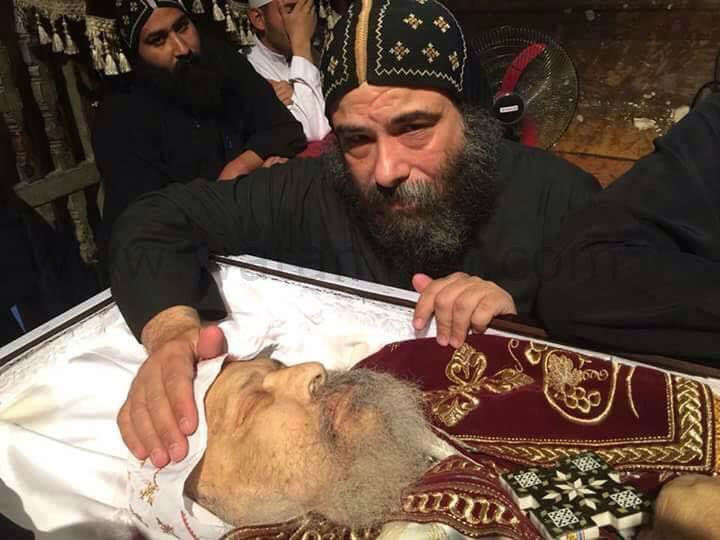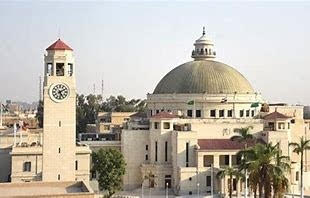Anba Raphail talks to Watani on the new bylaws for the election of the Coptic Orthodox patriarch
The issuing of the bylaws of the election for the Coptic Orthodox Patriarch, a year and three months after Pope Tawadros II was enthroned, is seen by the Coptic community as a significant achievement. Heated controversy had arisen among the Copts during the last few years on the need to change the bylaws which had been enacted as far back as 1957, so as to accommodate the changing conditions in the Church and increase in the number of the congregation. Pope Shenouda III, the charismatic previous patriarch of the Coptic Orthodox Church who passed away in March 2012 and who had been patriarch for 40 years, had rejected the idea of changing the bylaws before he died for fear of suspicions that the new bylaws may have been drafted to favour a specific candidate for the papacy. Once he passed away, the acting patriarch Anba Pachomeus and the Holy Synod agreed to hold the Papal elections according to the 1957 bylaws so as to avoid conflict, provided that measures would be taken to amend it directly after the election of the new pope.
It all started with the papal nominations of the 118th patriarch in April 2012. The bylaws then in action, which had been enacted back in 1957 when conditions in the Church and Coptic Orthodox congregation were very different from today, placed the nominations committee before a number of problematic issues. Anba Raphail, the bishop who heads the Holy Synod of the Coptic Orthodox Church told Watani that the committee had to abide by the 1957 bylaws, but recommended that the candidates for the papacy would pledge to amend and update the bylaws within one year of enthronement.
Outdated bylaws
“The new bylaws had to be in harmony with the times. The electorate could not remain restricted to the very limited number of voters specified by the 1957 bylaws, nor could bishops of parishes such as the Sudan, France and the UK remain deprived of the right to participate in the elections because they did not hold the Egyptian citizenship; the old bylaws stipulated that participants must be Egyptian nationals.
“There were also other problems. The 1957 bylaws did not clearly define the characteristics of the candidates for the papal seat, and the nomination procedure implied that the candidate would nominate himself, a move considered inappropriate by Church standards since it hints at greed for power or honour.”
Pope Tawadros II was enthroned in November 2012. Among the first decisions he took was to delegate the nominations committee with the authority to amend the bylaws. “The first draft of the amended bylaws was presented to the Holy Synod and sent to all the bishops for comment,” Anba Raphail said. “The comments were heeded and a new draft written and again sent to the Holy Synod for the bishops’ comments. Consecutive drafts were formulated in this manner until the pre-final draft was discussed by the Holy Synod in November 2013. The Synod decided to postpone the approval of the amendments to the following session of February 2014 in order to allow more time to finalise the document. Between these two sessions, many bishops and archbishops met in December at the Papal headquarters in Cairo in two informal meetings to discuss all the details of the bylaws and put in their final touches. On 20 February 2014, the Holy Synod headed by His Holiness Pope Tawadros voted for the new bylaws in a seven-and-a-half hour session. The bylaws’ 36 articles were put to an electronic vote, a first in the history of the Coptic Church, and were unanimously approved.”
Broader voter base
So how did the bylaws broaden the electoral base? Watani asked.
“The voter minimum age was reduced from 35 in the old bylaws to 25, allowing thus a larger number of Coptic youth to vote,” Anba Raphail said. “Many groups who had not been qualified to vote before were added to the voter list. Among them civil servants who hold at least the post of undersecretary of ministry; heads of the court of appeal; Generals of the army or the police; ambassadors; university professors; editors-in-chief of Christian newspapers and satellite channels; members of the boards of direction of trade unions, chambers of commerce, tourism and federation of industries. Add to that the groups that were already included in the previous bylaws such as the archons of the Church who are members and representatives of the Melli (Community) Council, the Coptic Endowments Authority, cabinet ministers, governors and MPs. The right to vote is not only restricted to the current holders of these positions but also to previous holders, male and female, living inside or outside Egypt. Electing the pope has become a right granted to any Coptic Orthodox archon of the community whereas the previous bylaws restricted it to 72 of Cairo’s archons, 24 of Alexandria’s and 12 of the archons of each parish.
“The new bylaws gave voting rights to all clergymen because it is unreasonable that they wouldn’t have a say in choosing their pastor. The old bylaws restricted the participation of members of the clergy in the electoral base to a number of representatives from each parish.
“The participation of monks is no longer restricted to the abbots and top ranking monastery officials, but now includes all monks ordained to the priesthood, mothers superior of convents, and 10 per cent of the nuns in each convent. Add to that representatives of male and female consecrated workers in Cairo, Alexandria, and the provinces, as well as members of the cantors union.
“It was inconceivable that the new bylaws would overlook the wide sector of volunteer services in the Church or the professors of Orthodox seminaries and theological institutes inside and outside Egypt. All the general bishoprics such as the Bishopric of Services and the Bishopric of Youth were also included with representatives such as in case of the parish bishoprics.”
Legislative power
Watani pointed out that despite the broad voter base, there were voices in the Church which saw it as curtailed democracy; they called for the right of all voters eligible to vote in civic elections to vote for the pope, and that the new bylaws should have been put up for community discussion.
But Anba Raphail reminded that Church tradition has it that only bishops and archbishops and top-ranking archons—the word archon means a leader of the congregation, not a mere member—elect the patriarch. “The position of pope,” he said, “is considered the highest worldly rank and it is inappropriate that anyone with insufficient experience or qualifications should choose him. Yet the representatives of the various sectors of the congregation stand in for those who are not entitled to vote.”
In the Church, the Holy Synod alone has the authority of legislation, Anba Raphail pointed out. The only exception to this rule has been the drafting of the papal elections bylaws in which members of the Melli Council and the Coptic Endowments Authority participated. “These laypersons represent all the members of the Coptic Orthodox congregation,” he said.
Nomination of parish bishops?
An issue that was widely seen as particularly thorny has been that of allowing parish bishops to be nominated for the papacy. “When this issue came up,” Anba Raphail said, “it was discussed calmly and objectively, because nobody was looking for personal benefit. Most members of the committee felt more comfortable with not allowing the nomination of parish bishops, but we realised a ban may not ultimately work for the best interest of the Church. What if, for some unforeseen reason, a parish bishop would be among the best candidates for the papal seat? The canon laws of the Church specify no such ban; they focus more on the competence of the candidates. The only compulsory condition is celibacy.”
Anba Raphail explained that Church tradition has it that a candidate for the papacy should come from among the ranks of the monks, have perfect knowledge of the Church laws, spiritual life, Orthodox faith and liturgy. The new bylaws thus leave the door open for the candidacy of parish bishops, but limits it to extreme or exceptional cases. “We were careful,” Anba Raphail said, “not to include in the bylaws any barriers that would prevent the future generations from choosing the best candidates for the papacy. The term ‘extreme or exceptional cases’ is flexible and can be defined by the Holy Synod when the need arises; no one can predict what circumstances the Church may encounter in the future.”
No second chance
The new bylaws stipulate that a candidate must be not less than 45 and not older than 65; he must have spent at least 15 years in monastic life. He must be Egyptian Coptic Orthodox born to Egyptian Coptic Orthodox parents, holder of a university degree or its equivalent, must have a thorough knowledge of the sciences and laws of the Orthodox Church, must be righteous in the matters of the faith and have the ability of teaching.
The candidate must also master the Arabic language and prayers in the Coptic language in addition to an appropriate knowledge of a foreign language and the means of modern technology and communication. He must not support any currents in conflict with the essence of the Coptic Orthodox faith, whether they are aberrant creeds or ones that don’t enjoy the endorsement of the Church by consensus. The candidate must not have been previously nominated for the papacy.
This last point especially was rather intriguing, and Watani asked Anba Raphail why they wouldn’t be given a second chance?
“The idea was that there was no point in nominating a person who had for one reason or another already been excluded. Whoever wants to serve doesn’t necessarily have to be a patriarch. He can serve on any other position and someone else may be nominated for pope; the Church is rich with figures who carry substantial potential. There was a large consensus on this specific point in the Holy Synod, even for those who were previously nominated for the papacy, including myself. Everybody is working for the Church and whoever becomes pope will be venerated by all of us and any power, reverence or authority bestowed on him will be for the Glory of Christ and the best interest of the Church.”
The altar draw
The bylaws retained the altar draw as the last step in choosing the pope, a procedure that is contested by some members of the congregation. It was inevitable to ask “Why?”
“The members of the Holy Synod and the nominations committee were well aware of the voices opposing the altar draw because they claim it’s a mystical move that is not compatible with our age of pragmatism. But the altar draw goes back to the first days of the early Church. The Acts of the Apostles states that it was held between Justus and Matthias to choose an apostle who would replace Judas. As far as I know, among the 118 successors of St Mark only ten were chosen by the altar draw, among whom the last three patriarchs. When there is consensus on one person, no need arises to perform an altar draw, but when it is difficult to choose between two or three candidates, a procedure must be adopted to make that choice. The altar draw was thus established because it is the closest to the traditions of the Church and whenever it was performed, Divine intervention was obvious, especially in the election of Pope Kyrillos VI, Pope Shenouda III and Pope Tawadros II. The experience of the Church proves that the altar draw gave the Church great popes who served the Church beautifully. So the Holy Synod decided to maintain the tradition of the altar draw.”
Watani International
9 March 2014















